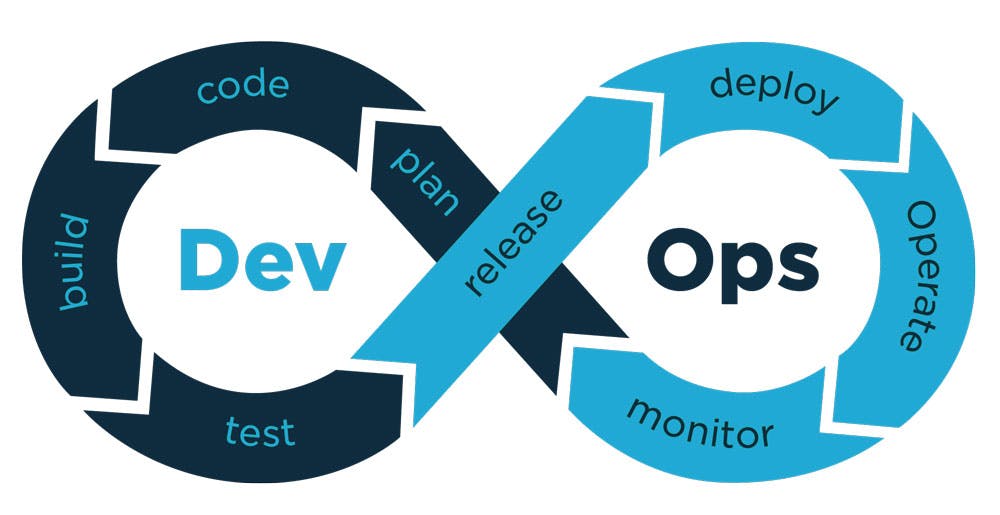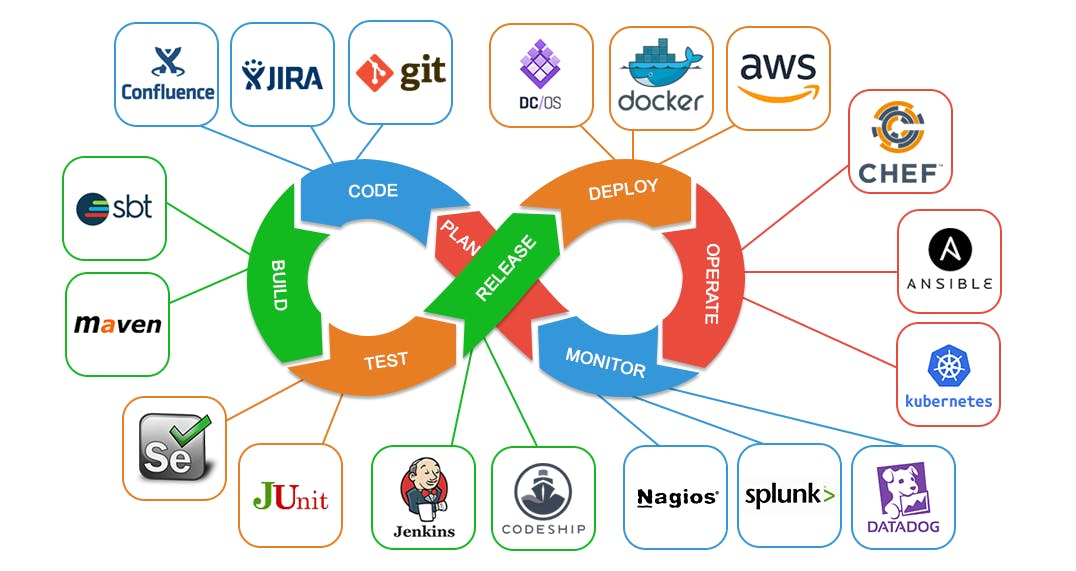I'm pretty sure that you've heard the word "DevOps" before. Still, you may not know what it actually means, or you are probably wondering whether DevOps is any tool or software that you need to master to become a DevOps Engineer. Don't worry at all, in this blog I'll clear all of your doubts regarding DevOps. So, let's start🚀.
Need for DevOps
Before diving deep into DevOps let's just spend some time understanding the need for DevOps. For small applications, DevOps is not necessary as you can handle everything from development to deployment by yourself but as your application starts growing and more users start using your application then you'll realize the importance of DevOps. Big companies like Amazon, Netflix, etc. use the DevOps approach as millions and billions of people are using their applications.
Basically, software development is divided into two parts. The first one is the "Development team" whose role is to design, develop and build the software while the other one is the "Operation team" which is responsible for testing, implementation, and deployment of the software. Sometimes there can be miscommunication between these two teams which results in delayed releases, system crashes, etc.
Therefore, we need some kind of methodology so that the entire process of application from development to deployment can go smoothly. That's where the concept of DevOps comes in handy.
DevOps helps in removing the communication and collaboration barriers between development and operation teams along with the fast delivery of the product hence improving customer satisfaction.
DevOps encourages faster, better, more secure delivery of the product to the end customers. It involves how quickly a product release or new feature gets into customers’ hands—all with the proper levels of quality and security. Or, it might focus on how quickly an issue or bug is identified, and then resolved and re-released.
What is DevOps?🤔
DevOps is neither a programming language nor software that you can use and master. DevOps consists of two words, Development and Operation. DevOps is actually a philosophy, tool, and practice that helps the development and operation team so that they can deliver the application and services efficiently.
Following are the benefits of DevOps:
- Faster and better product delivery
- Faster issue resolution and reduced complexity
- Greater scalability, reliability, and availability
- Automation and better security
- Improved collaboration
Now, let's take a close look at each segment of the DevOps one by one.
DevOps Lifecycle 🤩

As you can see that the DevOps lifecycle consists of eight phases representing the plan, code, build, test, release, deploy, operate and monitor. Here the processes on the left are the part of Development and the processes on the right are the part of the operation. As it is an infinite process hence the logo of DevOps represents infinity.
The different processes are:
Plan: This phase helps define business value and requirements. Sample tools include Jira or Git to help track known issues and perform project management.
Code: This phase involves software design and the creation of software code. Sample tools include GitHub, GitLab, Bitbucket, or Stash.
Build: In this phase, you manage software builds and versions, and use automated tools to help compile and package code for future releases to production. You use source code repositories or package repositories that also “package” infrastructure needed for product release. Sample tools include Docker, Ansible, Puppet, Chef, Gradle, Maven, or JFrog Artifactory.
Test: This phase involves continuous testing (manual or automated) to ensure optimal code quality. Sample tools include JUnit, Codeception, Selenium, Vagrant, TestNG, or BlazeMeter.
Releases: In this phase, a build is ready for deployment into the production environment
Deploy: This phase can include tools that help manage, coordinate, schedule, and automate product releases into production. Sample tools include Puppet, Chef, Ansible, Jenkins, Kubernetes, OpenShift, OpenStack, Docker, or Jira.
Operate: This phase manages software during production. Sample tools include Ansible, Puppet, PowerShell, Chef, Salt, or Otter.
Monitor: This phase involves identifying and collecting information about issues from a specific software release in production. Sample tools include New Relic, Datadog, Grafana, Wireshark, Splunk, Nagios, or Slack.
DevOps Best Practices😎
- Continuous Integration
- Continuous Delivery
- Microservices
- Infrastructures as Code
- Monitoring and logging
- Communication and Collaboration
Challenges that DevOps tries to solve🤔
- Miscommunication and lack of collaboration
- Conflict of interests between Development team and Operation team
- Security
- Application Testing
- Manual Work
Tools and Technologies that you need to learn as a DevOps Engineer👨💻

Concept of Software development: As a DevOps engineer, you'll not write code for the application but you need to know how developers work, which workflow they are using, how an application is configured, concepts of automated testing, and so on.
Operating System and Basics of Linux: As the application will be deployed to the server hence you will be responsible for preparing the infrastructure. Therefore, you should know Linux basics, shell commands, Linux file system, server management, etc.
Networking and Security: Even though the organization has separate engineers like Network Administrator and Security engineer but still you should have a basic knowledge of Networking and Security so that you can prepare the server and run the application.
Containers: As containers are becoming popular therefore you probably have to run the containers on the servers. Therefore, you have to understand the concept of virtualization and containers. One of the most popular container technology is Docker, therefore you should know about Docker.
Build Automation and CI/CD: Here you need to learn about Continuous Integration and Continuous Delivery. For this, you need to learn tools like Jenkins, Docker, Docker Hub, etc. CI/CD is an important topic in itself, therefore we'll talk more about CI/CD in different blog
Cloud Providers: Nowadays, instead of running their servers, the company prefers to use Cloud providers platforms as it saves costs, and Cloud provider platforms manage everything for you like load balancing, clustering, backup, security, etc. There are multiple cloud providers like Google Cloud, Amazon Web Services, Microsoft Azure, etc. You have to learn any one of these Cloud Providers platforms.
Container Orchestration: As we are running our application on containers and we may be running lots of containers like microservices, therefore we need a Container Orchestration tool like Kubernetes. Therefore, you should be familiar with Kubernetes
Monitoring: Here you need to learn some tools like Prometheus, Nagios, etc. as you are running multiple Kubernetes clusters and you need to monitor them to track performance, discover problems, and monitor software and infrastructure.
Infrastructure as Code: Infrastructure as Code (IaC) is the management of infrastructure (networks, virtual machines, load balancers, and connection topology) in a descriptive model, using the same versioning as the DevOps team uses for source code. Like the principle that the same source code generates the same binary, and the IaC model generates the same environment every time it is applied. IaC is a key DevOps practice and is used in conjunction with Continuous delivery.
Here you need to learn two types of IaC tools to make your work more efficient and to
make your environment more transparent:
- Infrastructure providing tool: Terraform
- Configuration management tool: Ansible, Chef, puppet, etc.
Scripting Languages: You may need to write some small code to automate tasks for development and operations like backups, system monitoring, etc. Therefore, you need to know a scripting language. It can be OS-specific like Bash or PowerShell, or it can be OS-independent like Python, Go, or Ruby.
Version Control System: You need to learn a Version Control System like Git to manage your application as well as Infrastructure Code.
We've talked about various things, tools and technologies in this blog and it can be overwhelming for you. But hey, you don't have to learn all of these things in one go. Just start by starting with DevOps and eventually, you'll learn these technologies as you'll move forward.
I hope this blog helps you in understanding the concept of DevOps and what tools and technologies you need to learn to become a DevOps engineer.
Thank You😄